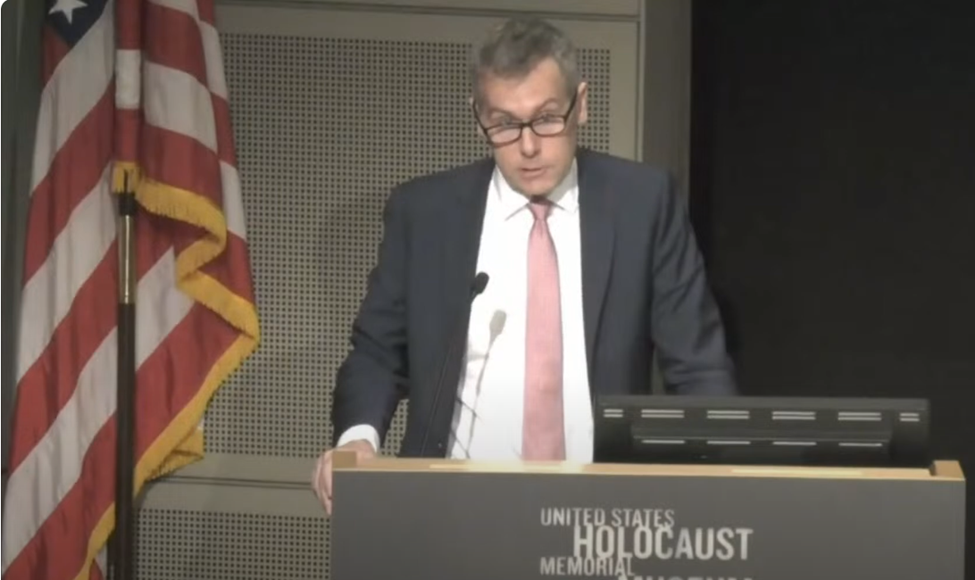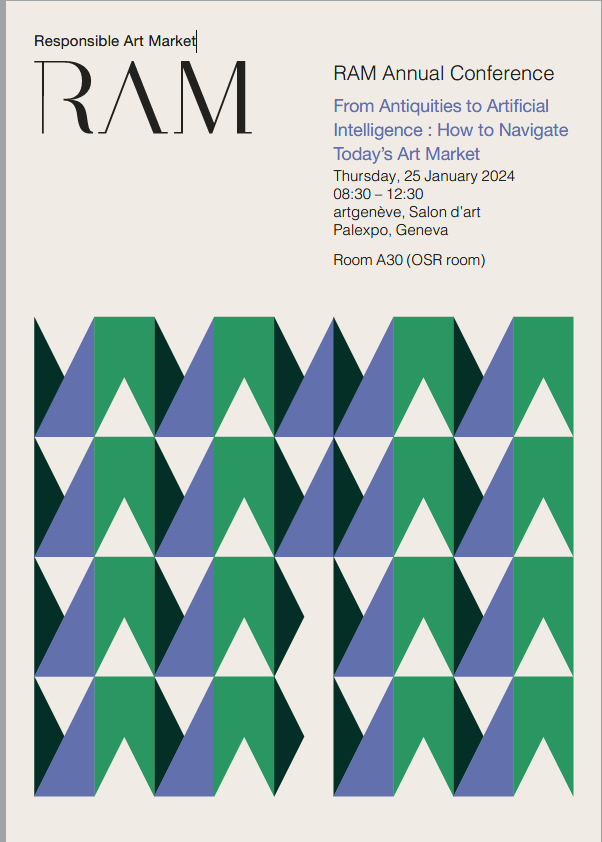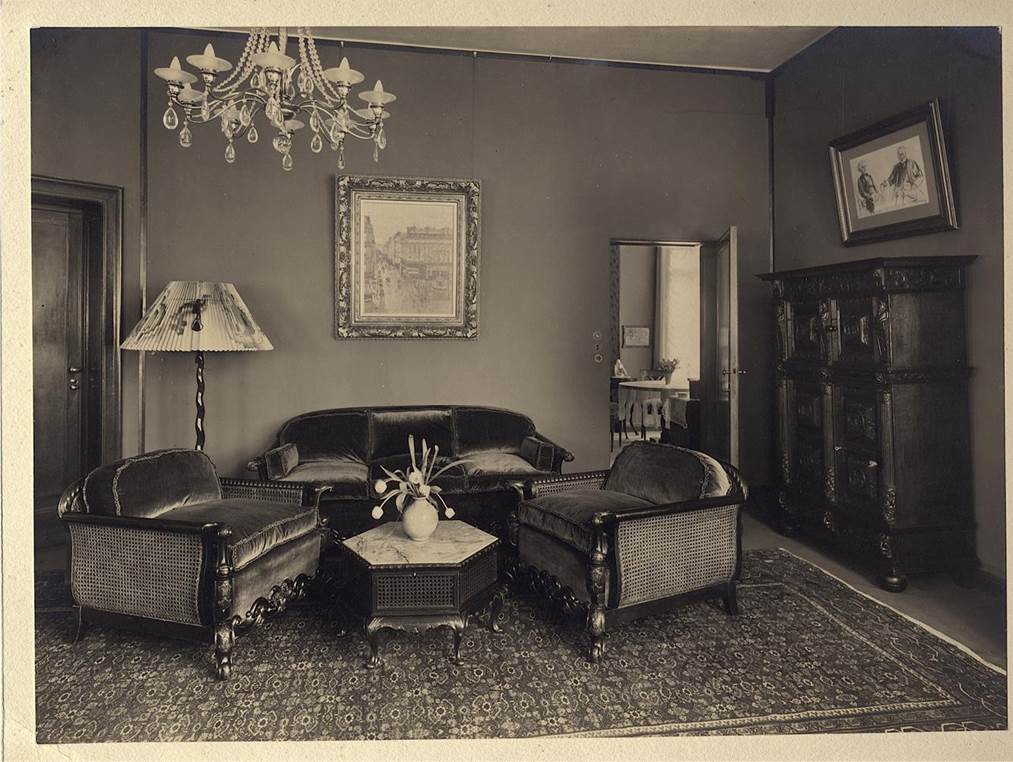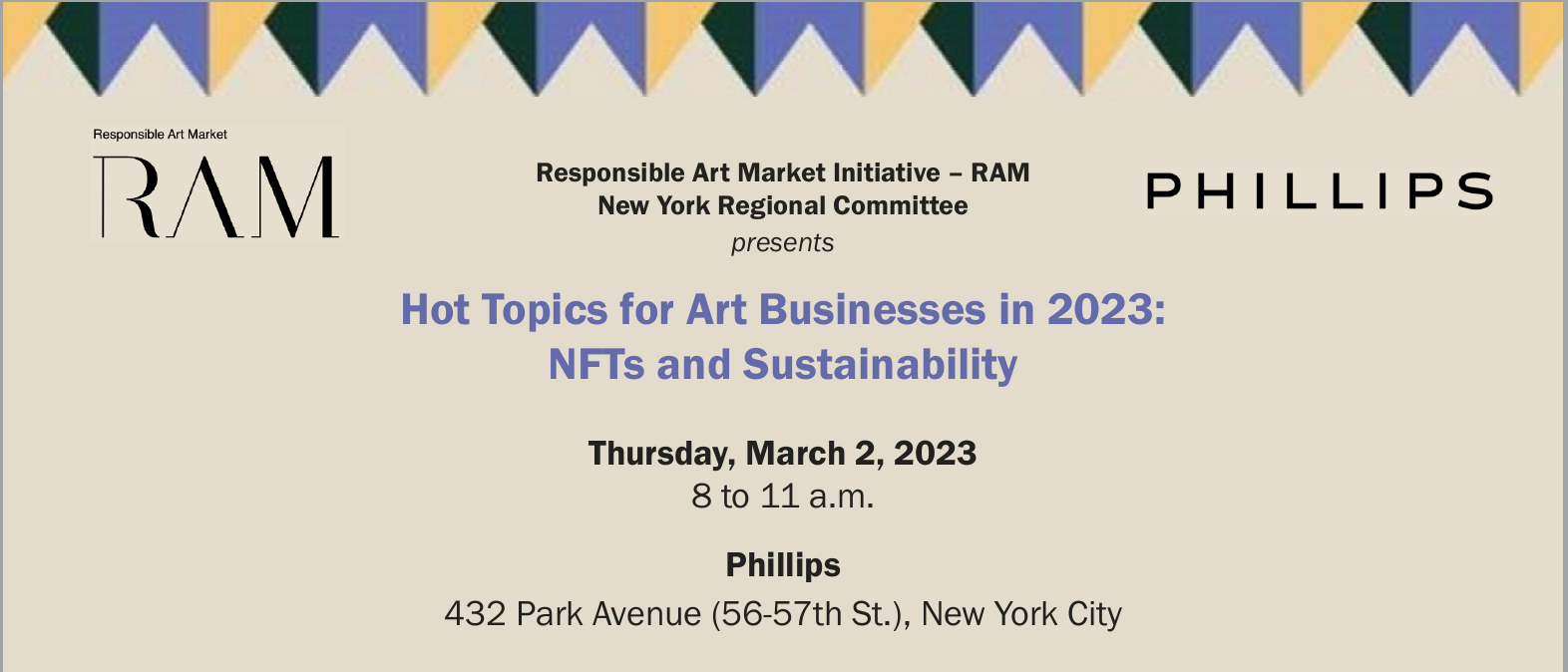I was honored to be among the speakers this week at the United States Holocaust Memorial Museum on March 5, 2024. Convened by the World Jewish Restitution Organization and the U.S. State Department, the event announced the Best Practices for the Washington Conference Principles on Nazi-Confiscated Art (available here), and a report (available here) by the WJRO on the status of restitution progress worldwide. The Best Practices were a collaboration by the network of Special Envoys on Holocaust issues, in recognition of the 25th anniversary of the Washington Conference Principles on Nazi-Confiscated Art in 1998.
Best Practices for Nazi-Era Art Presented at Special Event in Washington
Topics: Washington Principles on Nazi-Confiscated Art, 1998 Washington Conference on Holocaust-Era Assets, WJRO, State Department, Leiden University, Stuart Eizenstat, Claims Conference, Antony J. Blinken, Gideon Taylor, Colette Avital, Michael Herzog, Ellen Germain, Dr. Wesley Fisher, Dr. Ruth J. Weinberger, Prof. Dr. Meike Hopp, Technische Universität Berlin, Lord Eric Pickles, Prof. Leora Bilsky, Tel Aviv University, Dr. Evelien Campfens
March 1, 2024 Event: “Protecting Cultural Property: The 1954 Hague Convention at 70”
The Kernochan Center for Law, Media, and the Arts at Columbia Law School, the U.S. Committee of the Blue Shield, and the New York chapter of the Responsible Art Market Initiative (of which I am co-chair with Birgit Kurtz) have organized an event on March 1, 2024 to be held at Columbia Law School entitled “Protecting Cultural Property: The 1954 Hague Convention at 70.”
Topics: Jane Levine, Philippa Loengard, Kernochan Center for Law Media and the Arts, DePaul University College of Law, Columbia Law School, Sotheby's, Patty Gerstenblith, Responsible Art Market, Lucian Simmons
Symposium at the University of Kansas: “A Museum's Purpose”
I am pleased to be taking part in a symposium at the University of Kansas School of Law in Lawrence, Kansas, on February 23, 2024, entitled “A Museum's Purpose.” Organized by KU Law and the Kansas Journal of Law & Public Policy Symposium, the symposium will feature presentations on a variety of cultural property topics. I will discuss a paper I am writing about the emerging concept of Fluchtgut—flight goods, or property sold by Jewish owners fleeing Nazi persecution but after reaching neutral or free territory. Other speakers include Craig M. Blackwell, associate general counsel, Smithsonian Office of the General Counsel; Col. Scott DeJesse, senior heritage and preservation officer, U.S. Department of Defense; Derek Fincham, law professor, South Texas College of Law Houston; Michael Hoeflich, John H. & John M. Kane distinguished professor of law, University of Kansas School of Law; MacKenzie Mallon, provenance specialist, The Nelson-Atkins Museum of Art; Lauren Van Schilfgaarde, assistant professor of law, UCLA School of Law; and Jonathan Zwibel, deputy associate chief counsel, U.S. Customs and Border Protection.
Topics: Events
Responsible Art Market Initiative—Annual Conference January 25, 2024 in Geneva
The Responsible Art Market Initiative will hold its annual conference next week in Geneva on January 25, 2024 (Thursday) at the art fair artgenève. RAM, which has increasingly been recognized as an industry leader in best practices in the art market, will present a keynote speaker and two discussion panels (one of which I will chair). The program and registration are available here.
After introductory remarks by Anne Laure Bandle of Borel & Barbey, Anthony Meyer of Galerie Meyer Oceanic & Eskimo Art in Paris will deliver the keynote address.
Next, I will moderate a panel of experts to discuss the current antiquities market. We will present and analyze some updated guidance to the RAM Due Diligence toolkit to address the antiquities market specifically.
The final panel of the day will discuss artificial intelligence (AI) and at. Few topics are as salient today as AI.
RAM’s events are always a unique opportunity to gather with art market participants from many sectors of the market. I look forward to seeing you in Geneva!
Topics: Anne Laure Bandle, Maastricht, TEFAF, Paris, Geneva, Mathilde Heaton, Jean-Bernard Schmid, Responsible Art Market initiative, Borel & Barbey, Phillips Auctioneers, Lausanne, artgenève, Anthony Meyer, Galerie Meyer Oceanic & Eskimo Art, Will Korner, Isabelle Tassignon, Fondation Gandur pour l’Art, Eric Drass, shardcore, Nicolas Henchoz, EPFL+ECAL Lab, Alexandre Jotterand
Thyssen-Bornemisza wins Pissarro painting sold under Nazi duress by Lilly Cassirer
The U.S. Court of Appeals for the 9th Circuit ruled on January 9, 2024 that the Thyssen-Bornemisza Collection Foundation in Madrid is the owner of Rue Saint–Honoré, après-midi, effect de pluie (1892) by Camille Pissarro, a painting sold by German Jew Lilly Cassirer under Nazi duress. After the Cassirer family prevailed in the Supreme Court in 2023 that the 9th Circuit had previously applied the wrong legal test, the question before the 9th Circuit was the choice of which law to apply. In any case where the parties and subject matter are in different jurisdictions (or within overlapping jurisdictions like state and federal), a court must first decide which body of law to apply in analyzing a particular case. Here, the 9th Circuit ruled that Spanish law applied because Spanish law would be harmed more than California law if the other body of law applied (known as comparative impairment analysis). This, in turn, led to the holding that the Thyssen-Bornemisza Collection Foundation acquired good title after holding the painting for long enough that prior claims were extinguished.
The decision is thinly-reasoned. It looks to the “place of relevant conduct” as paramount to choosing applicable law, but concluded that the only relevant conduct was Spain’s purchase in 1993 of the Baron Hans Heinrich Thyssen-Bornemisza’s collection. Not the Baron’s Swiss residence, not his purchase of a stolen painting in New York (not located in Spain when last we checked) in 1976, not the earlier (New York) sale by Knoedler Gallery, nor the painting’s passage through California in the 1950s, nor the source of the defect in the first place: Nazi Germany. Rather, The court insultingly referred to Holocaust survivor and refugee Claude Cassirer’s life in California as a “fortuity.” As the late Justice Antonin Scalia might have said, “pure applesauce.”
The upshot is that a state (Spain, through the TBC) that did not acquire good title to a painting that was indisputably dispossessed by the Nazis will (barring further review) keep this ill-gotten property. Spain should have returned the painting the first time it was asked to do so. Digging its heels in over 18 years of litigation is a mockery of the commitments Spain made in the 1998 Washington Principles on Nazi-Confiscated Art. Nothing about Spanish law is impaired by refusing to honor a transaction at the direction of the Nazis.
The family has vowed to fight on, and good for them. As I often tell people as an example to frame this issue and this case, the picture below is of the painting in Lilly’s home. Now imagine that this was your home, and the very worst person you knew came in and demanded it because he knew you had no power to resist. Would you give up?
Topics: Lilly Cassirer, Rue Saint-Honoré après-midi effet de pluie, Claude Cassirer, Foreign Sovereign Immunities Act, California, Washington Principles on Nazi-Confiscated Art, Spain, FSIA, Camille Pissarro, Ninth Circuit Court of Appeals, Cassirer v. Thyssen-Bornemisza Collection, Jakob Scheidwimmer, Sydney Schoenberg, Eugen Kampf, Antonin Scalia, Hans W. Lange, Federal Republic of Germany v. Philipp, Philipp v. Stiftung Preussischer Kulturbesitz, Simon v. Republic of Hungary, choice of law, Baron Thyssen-Bornemisza
Lawsuit Seeking to Stop Deaccessioning of Paintings at Valparaiso is Dismissed
A trial court in Indiana recently dismissed a lawsuit challenging the proposed sale of three works of art by Valparaiso University: Rust Red Hills by Georgia O’Keefe, Mountain Landscape by Frederic Edwin Church, and The Silver Veil and the Golden Gate by Childe Hassam. This controversy highlights many of the issues surrounding the deaccession of art by American museums. In ruling that the former director of the Brauer Museum of Art at Valparaiso and the museum’s key benefactor both lacked standing to sue the university over the planned sale, the decision tracked other recent results about non-profit oversight, highlighting just how critical the engagement of a state’s Attorney General is.
Whatever the merits of this rule on standing are, however, the university seems to be violating a condition of the 1953 agreement it made to obtain these works of art, yet nine months on the Attorney General has not exercised his undisputed prerogative to stop it. Non-profit governance is hard in a world of finite charitable resources. But universities caught in the arms race of new dorms and laboratories would do well to consider the core mission and what makes it possible. The chance to sit with a painting by Hassam, Church, or O’Keefe was well recognized by the original benefactor Percy Sloan, and this university agreed to abide by that condition. It should keep its word. Selling art to plug budget holes is like eating the seed corn; it robs the future.
Topics: Rose Art Museum, Supreme Judicial Court, Deaccessioning, New York Times, Brandeis University, Berkshire Museum, Frederic Edwin Church, Attorney General, Mountain Landscape, The Silver Veil and the Golden Gate, Georgia O'Keefe, Childe Hassam, Rust Red Hills, Breuer Museum of Art, Percy Sloan, Junius Sloan, Sara Sloan, Justice David Lowy, Todd Rokita, José Padilla
German High Court Rules Painting Will Stay Listed in Nazi-Era Lost Art Provenance Database
(Germany’s highest court issued a much-anticipated ruling on a challenge by a collector to the listing of his painting in the so-called Lost Art database in Magdeburg, Germany. The Bundesgerichtshof (BGH) ruled that the listing will not be deleted where “based on true facts.” The ruling underscores the informative, rather than legal, nature of the database, which describes itself as documenting “cultural property that was either demonstrably seized from their owners between 1933 and 1945 as a result of Nazi persecution, or for which such a seizure cannot be ruled out.” Insofar as the case just decided involves a well-known victim of Nazi-persecution, the clarification is a welcome and important one. As always in this area, however, the hard cases are harder. The case stopped short of resolving more nuanced cases, or addressing what recourse a collector might have in situations where a listing effectively makes a painting impossible to sell. Perhaps the best course would be to take heed of the way the court decided this case: the database is a critical tool of information, but a less useful one when it comes to sorting out legal rights.
Topics: Lost Art Database, Germany, Bundesgerichtshof, Van Gogh, Magdeburg, Nazi persecution, BGH, IFAR, Art Loss Register, A Tragic Fate, Girl from the Sabine Mountains, Francis Xavier Winterhalter, Vue de l'asile et de la Chapelle de Saint-Rémy, Elizabeth Taylor, German Lost Art Foundation, Calabrian Coast, Kalabrische Küste, Concordia University, Zentrum für Kulturgutverluste, ALR, Düsseldorf, Bettina Brückner
New Article in Apollo magazine: The Supreme Court has saved the Andy Warhol Foundation from itself
Following the recent Supreme Court decision in Andy Warhol Foundation for the Visual Arts v. Goldsmith, I wrote an article in Apollo magazine discussing the result. The bottom line is that I continue to see the result as a sensibly practical one, that resets the over-reliance on a transformative test that had no limits in the execution. I also dislike the dissent more each time I read it.
Topics: Campbell v. Acuff Rose Music Inc., Supreme Court, Copyright, Fair Use, Andy Warhol Foundation for the Visual Arts, Apollo Magazine, Kagan, Lynn Goldsmith
Look to the Purpose, not the Meaning—Supreme Court Rejects Warhol Foundation’s Fair Use Defense Against Lynn Goldsmith
The Supreme Court of the United States has issued its long-awaited ruling in the dispute between photographer Lynn Goldsmith and the Andy Warhol Foundation for the Visual Arts (AWFVA) on May 18, 2023. The Court held the AWFVA’s delivery to Condé Nast magazine in 2016 of an Andy Warhol silkscreen from 1984 based on a 1981 Goldsmith photograph of the musician Prince did not satisfy the first factor (of four) of the statutory fair use elements. The Court took a narrow approach, explicitly declining to reach the question of whether Warhol’s original work would qualify for a fair use defense, holding only that the 2016 use did not.
(Williams College Museum of Art Security Badge, ca. 1993)
Topics: Cariou v. Prince, Copyright Act, Philippa Loengard, Campbell v. Acuff Rose Music Inc., Kernochan Center for Law Media and the Arts, 17 U.S.C. § 107, Columbia Law School, Andy Warhol, Fair Use, Andy Warhol Foundation for the Visual Arts, Syracuse University, Condé Nast, Kagan, Sotomayor, Roberts, Titian, Lynn Goldsmith, Vanity Fair, Thomas, Giorgione, Goya
Join the Responsible Art Market Initiative March 2, 2023 at Phillips in New York
Registration is now open here for our first in-person event in more than three years! We will meet at Phillips auction house’s stunning new locationfor lively discussions of two hot topics affecting the art world. I am very proud that my partners at Sullivan & Worcester LLP and I are one of the lead event sponsors as well. There will also be time for networking and for viewing the workscoming up for sale at Phillips’ March 8 “New Now” auction. The event is free of charge, but you must register in advance.
Topics: TEFAF, Crozier Fine Arts, Nicholas M. O'Donnell, Responsible Art Market initiative, Sustainability, Phillips, Birgit Kurtz, Nanne Dekking, Artory, Laura Lupton, Nicole Bouchard Tejeiro, Louise Carron, Klaris Law PLLC, Citi Global Wealth, Elena Zavelev, Ben Heim, NFTs, Galleries Commit, Sofie Scheerlinck, Deborah Querub



.jpg)






